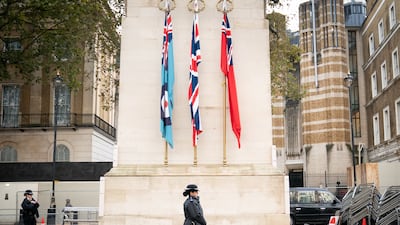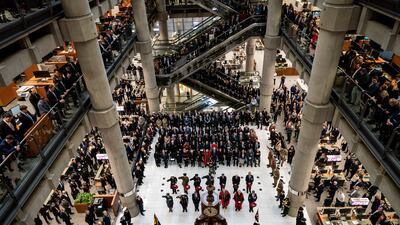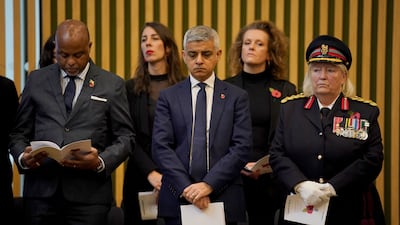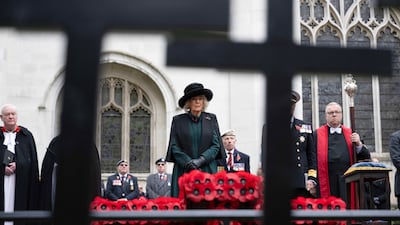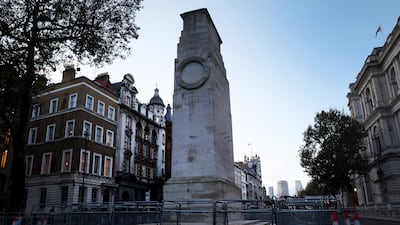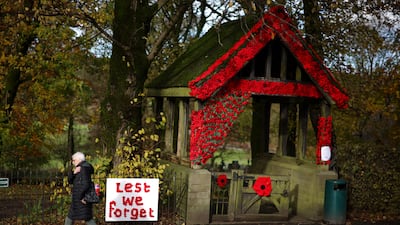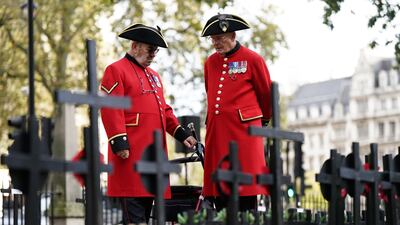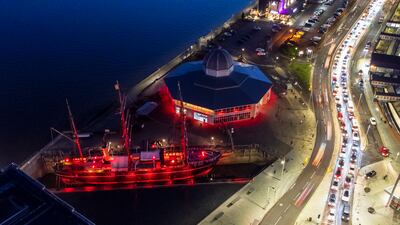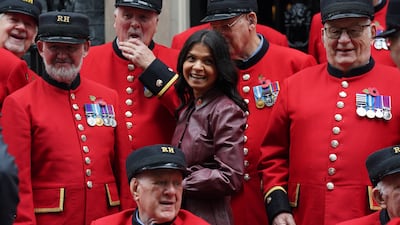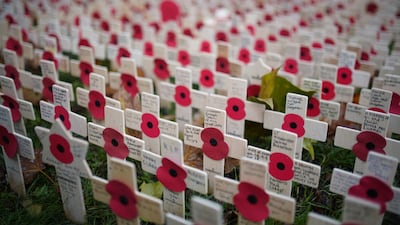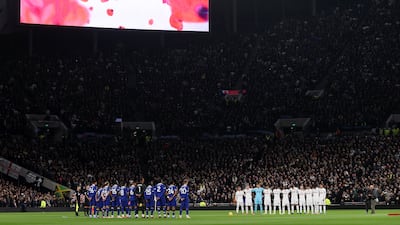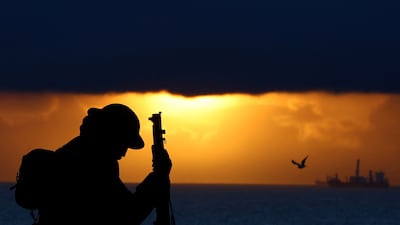Live updates: Follow the latest news on Israel-Gaza
Marches have been held on the streets of London on consecutive Saturdays since the Hamas attacks on Israel on October 7.
In the aftermath of previous marches, the actions of some protesters have become a political issue.
Another march is planned for this Saturday, which has led to several objections and appeals for the march to be postponed or banned.
After last weekend’s march, police said a “pro-Hamas” leaflet was on sale, while some demonstrators threw fireworks at officers and climbed on Trafalgar Square’s fountains.
UK Home Secretary Suella Braverman said chants by some demonstrators were anti-Semitic and implied the erasure of Israel.
Why has Saturday’s march become particularly contentious?
Saturday is Armistice Day – the 11th day of the 11th month, marking the moment when the guns fell silent in the First World War. Nowadays, Armistice Day in Britain recognises all those who died fighting for the United Kingdom in wars since 1914.
While official commemorations take place on Remembrance Sunday, the following day, there are still gatherings at the Cenotaph war memorial on Saturday.
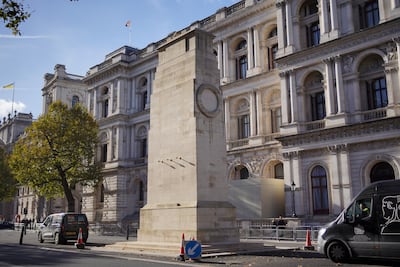
Some argue that no protests should take place on November 11 out of respect for those who died for their country. It has been described as a “sacred day” by government minister Steve Barclay.
“I don't think there should be a march on Armistice Day, I think it's the most sacred day in the calendar, it's the time when the country comes together,” he said.
This is a view shared by Conservative MP Richard Drax, who told the Commons he is proud of the royal family, the UK and “our democracy”, saying: “It saddens and concerns me that there is a significant minority who do not share my views and some of them plan to march in London during this remembrance weekend.”
“The right to protest peacefully in this country is long held and rightly so,” the MP for South Dorset added.
“However, Saturday’s march must be banned. Not only is it disrespectful, but there is a genuine risk of disorder, potentially on a large scale.
“I would urge those who are genuinely concerned about the war in Gaza to stay at home on this special weekend of remembrance.
“To those who do attend, I say there can be no other reason than to cause trouble.”
What have the police said?
The Metropolitan Police have urged the march’s organiser to reconsider holding the event.
Senior officers have cited concerns about violence and disorder stemming from breakaway groups linked to the protests.
The force could request the power to ban the event under Section 13 of the Public Order Act 1986, but that would only apply if there was the threat of serious public disorder which could not be controlled by other measures.
The force’s commissioner, Sir Mark Rowley, said intelligence on the potential for serious disorder does not meet the threshold to suggest a “real threat”, so the march cannot be banned.
“The laws created by Parliament are clear. There is no absolute power to ban protest, therefore there will be a protest this weekend,” he said.
Prime Minister Rishi Sunak has said he will hold Sir Mark “accountable” for his decision to approve the march, which he called “disrespectful”.
During a meeting at Downing Street on Wednesday afternoon, Rishi Sunak said Sir Mark was committed to keeping the force’s “posture under constant review” before the pro-Palestinian protest planned on Armistice Day.
In a statement following his talks with Sir Mark over the planned event, the Prime Minister said: “This weekend people around the UK will come together in quiet reflection to remember those who made the ultimate sacrifice for this country. It is not hyperbole to say that we are the beneficiaries of an inheritance born of their sacrifice.
“It is because that sacrifice is so immense, that Saturday’s planned protest is not just disrespectful but offends our heartfelt gratitude to the memory of those who gave so much so that we may live in freedom and peace today.
“But part of that freedom is the right to peacefully protest. And the test of that freedom is whether our commitment to it can survive the discomfort and frustration of those who seek to use it, even if we disagree with them. We will meet that test and remain true to our principles.
“This afternoon I asked the Metropolitan Police Commissioner, Sir Mark Rowley, to come to Downing Street and provide reassurances that the police are taking every step necessary to safeguard remembrance services, provide reassurance to those who wish to pay their respects across the country and keep the public safe from disorder this weekend.
“It’s welcome that the police have confirmed that the march will be away from the Cenotaph and they will ensure that the timings do not conflict with any Remembrance events.
There remains the risk of those who seek to divide society using this weekend as a platform to do so. That is what I discussed with the Metropolitan Police commissioner in our meeting.
The commissioner has committed to keep the Met Police’s posture under constant review based on the latest intelligence about the nature of the protests.
“And finally, to our veterans and their families, I assure you that we will do everything it takes to protect this special weekend for you and our country, as we come together to reflect on those who protected our freedom.”
Meanwhile, Home Secretary Suella Braverman accused police of “double standards” and “playing favourites”.
Ms Braverman claimed that “pro-Palestinian mobs” are “largely ignored, even when clearly breaking the law”.
Writing in The Times, Mrs Braverman said: “I do not believe that these marches are merely a cry for help for Gaza.
“They are an assertion of primacy by certain groups – particularly Islamists – of the kind we are more used to seeing in Northern Ireland. Also disturbingly reminiscent of Ulster are the reports that some of Saturday's march group organisers have links to terrorist groups, including Hamas.”
She claimed “there is a perception that senior police officers play favourites when it comes to protesters”.
“Right-wing and nationalist protesters who engage in aggression are rightly met with a stern response yet pro-Palestinian mobs displaying almost identical behaviour are largely ignored, even when clearly breaking the law?” she said.
“I have spoken to serving and former police officers who have noted this double standard.
“Football fans are even more vocal about the tough way they are policed as compared to politically connected minority groups favoured by the left.
“It may be that senior officers are more concerned with how much flak they are likely to get than whether this perceived unfairness alienates the majority. The government has a duty to take a broader view.”
What is planned and what have the march organisers themselves said?
The organisers have said the march’s route will be from the corner of Hyde Park to the US Embassy in south London and will not travel through Whitehall, where the Cenotaph is located.
The march will begin at 12.45pm, almost two hours after the national two minutes' silence of commemoration.
The six organising groups, including the Palestine Solidarity Campaign, released a statement asserting their right to protest.
“The idea that it is acceptable for Israel to keep bombing and killing Palestinians in Gaza including over 4,000 children, but not for people to protest peacefully against these crimes is grotesque,” it read.
Who are the six groups organising the march?
The Palestine Solidarity Campaign, Friends of Al Aqsa, the Stop the War Coalition, Palestinian Forum in Britain, the Muslim Association of Britain and the Campaign for Nuclear Disarmament form the umbrella of groups organising the march.
Why is there concern about potential escalation?
There are fears breakaway groups, fuelled by anger at Israel, could clash with counter-demonstrators.
Free Palestine graffiti was sprayed on Rochdale Cenotaph while anti-Islam groups have called for a counter-protest.
English Defence League founder Tommy Robinson, who has been allowed back on X, formerly known as Twitter, after being banned for “hateful conduct” said on the platform: “British men are mobilising for Saturday to be in London.”
This is to “show our Government and show our police and show Hamas and everyone sitting around the world saying 'Britain has fallen' that there is a resistance”.
Veterans minister Johnny Mercer said he has been speaking to all sides and emphasised: “no one's coming near the Cenotaph to protest, the route isn't coming anywhere near here.”
“Measures will be in place to ensure people can all go about Remembrance in the way they want to, unmolested by any other events taking place this weekend, so please do come to London, it's a really important weekend,” he told the BBC.


